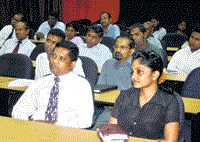|
Money laundering and auditing By Robert Ingall The library discussion at CIMA earlier last week was entitled: “What could put an accountant behind bars?” To say it was an unusual topic was a bit of an understatement, but when it was explained that it was to do with the passing of the Financial Transactions Reporting and Anti-Money Laundering laws earlier this year, it made more sense. For the two lawyers brought in to explain the aspects of the laws, even they weren’t 100 percent sure of all it included, but as Kithsiri Gunawardena, head of the Legal Department at Lanka Orix Leasing, said the law was passed (in parliament) in five minutes, which does seem to be a bit lax.
It was Mr. Gunawardena’s job to explain what it meant as far as money laundering went, while Neomal Goonewardene, a partner at Nithya Partners, a law firm, was to explain what penalties were involved. Both lawyers were not too impressed with the speed of the passing into law, noting that certain details were vague and difficult to interpret.
Dealing with money-laun dering, they said it is defined as the process by which cash and property gotten by illegal means is converted into money or property that was acquired legally, As for the application of the law as to what someone has to do to fall foul of it, here someone has to engage directly or indirectly in the process of acquiring cash and property via unlawful activities; this also includes receiving, possession and concealment. If caught laundering, a fine of the value of the cash or property, to a maximum of three times, is delivered. The unlawful activities to attain money cover a multitude of sins from dealing in drugs, to terrorists, to trafficking people, to cyber crimes. For an accountant, if he or she feels that such activities are going on that person is obliged to disclose such practices, even if confidentiality contracts have been signed. Mr. Gunawardena said the best thing was to get to know your customer inside out to ensure everything is above board, but not to the extent or hiring a private detective. He talked more about the actual law and what it means if you get on the wrong side of it. But first he said both laws were a worry as they were not well worded and could lead to a lot of confusion. After explaining the numerous ways that can be used to fall foul of the law, he went on to explain what has to be done if a person is thought to be acting suspicious.
If someone or some company is thought to be money-laundering, they must be reported to the Finance Intelligence Unit (FIU), under the Central Bank. But remember if you do report such a case, you can get into trouble if you talk about it to anyone outside the FIU. If a person is found to have broken that rule, they are liable to a fine of up to Rs 1 million, but not a prison sentence. Mr Goonawardena said that if illegal activities are discovered it’s up to the auditor and his or her firm to discourage the client from continuing the practice. Now these are just the tip of the iceberg for the rules and fines that are included in the laws, which do seem to have been rather rushed. As someone commented the other night: “If this was the US the bill would have
gone before countless committees and been heavily debated in the
Senate and Congress, but here, I guess not.”
DHL role in bringing Mission Impossible to Sri Lanka The pulse racing action thriller "Mission: Impossible III” premiered in Sri Lanka last week at the Liberty Cinema in Colombo on the same day it opened in theatres across the U.S. through DHL, the official shipping and logistics partner for the motion picture. The night’s events began with the DHL van delivering the MI3 film reel to the Liberty Cinema just moments before the screening of the movie. The DHL delivery van escorted by a motorcade rushed along the Galle road from Galle Face Green up to the Liberty Cinema to deliver the MI3 film reel on time. Invitees for the MI3 premier in Sri Lanka included leading artists from the film and music industry, corporate heads and DHL-MI3 promotion winners.
In the most highly anticipated action-thriller of 2006, Tom Cruise returns to one of his signature roles as Secret Agent Ethan Hunt, who confronts the toughest villain he’s ever faced – Owen Davian, an international weapons supplier. with no remorse and conscience. DHL, played a pivotal role behind the cameras in arranging a charter flight from Beijing to Los Angeles, to packing, crating, and shipping technical equipment to numerous filming locations in Italy, the United States, China and Germany.
Motivational speaker at CIMA Business Leaders’ summit World renowned author of international best-seller “You Can Win,” and motivational speaker, Shiv Khera, will lead the top list of speakers at the CIMA Business Leaders’ summit 2006 from June 1 to 3. Mr Khera, who works to inspire people and help them realise their true potential, will present a paper entitled “Winners don’t do different things, they do things differently”. He will give real-life examples and motivational stories and offer practical advice to help delegates embrace a more positive, successful way of life to realize their true potential. Mr Khera is probably the best example of the success of his philosophy and methods. From humble beginnings in India, he moved to the USA and experienced his own share of struggle and failure before attending a motivational lecture by Norman Vincent Peale that changed his life. “After that lecture, I realized that I was my own biggest problem, and then the direction of my life changed”, Mr Khera said. Now based in Singapore, he has followed up his original million-sales book with the publication of two more best-sellers - Living With Honor and Freedom is Not Free.
Central Bank's new facility for investors in government securities Central Bank of Sri Lanka has introduced a new system called LankaSecureNet, to enable investors of government securities to obtain details on their investments at any point of time through the Internet. The facility provided free of charge, allows account holders to view details of his/her investments, instantaneously and would also enable investors, especially the corporate investors to carry out daily reconciliation on their investments in government securities, the bank said in a statement. Through this system, investors of government securities are able to obtain information on their transactions, interest income and outstanding balances of scripless Treasury Bills and Treasury Bonds. In addition, historical information relating to investments on Treasury Bills and Treasury Bonds also can be obtained through this facility. With the termination of issuing scrip securities, the Central Bank has taken steps to issue the following statements to investors confirming their transactions, receivables and outstanding balances: statement of transactions; statement of payments and statement of holdings. All transactions which take place during a month are indicated in the statement of transactions, which is issued monthly. The details of all maturity payments and interest payments are conveyed to investors by the statement of payments, which is issued soon after the payments are made. The statement of holdings, issued bi-annually on June 30 and December 31 each year, gives information on total holdings of an investor. "It is expected that this facility would contribute to widen the government securities market by providing the investors with up to date information on their investments in government securities," the bank said.
Eco friendly supplements to urea and super phosphate By Dr. Arun Laxman Agricultural Biotechnologist Although agriculture in Sri Lanka is driven by technology, yields recorded by many crops show declining trends, which is a matter of great concern. The main reason for a yield plateau is the deterioration in soil wealth and due to the exploitation and mismanagement of this vital resource. Soil, the basic input for agriculture is considered a living entity. The various micro and macro organisms add life to the soil by their presence and activities. The beneficial microorganisms are responsible for increasing nutrient availability to crops by the biological processes such as Nitrogen fixation, Phosphorus solubilisation, and plant growth promoter’s secretion. They also help the crop plants by suppressing plant pathogens in the soil by antibiosis and competition. Unfortunately due to the excessive usage of toxic chemicals and minimum usage of organic manure the populations of these beneficial microorganisms are badly affected resulting in poor soil fertility. Hence rejuvenating our soil system is a crucial need that will help to overcome the yield barrier. The soil can be rejuvenated through various eco friendly agro inputs such as bio-fertilizers, enriched vermicompost, Plant Growth Promoting Pseudomonads (PGPP) etc. These microbial inoculants not only help to improve the soil fertility but also minimize the requirement of the chemical fertilizers such as urea and Super phosphate. Bio-fertilizers Biological routes of improving soil fertility for optimum crop production are vital components of integrated nutrient supply systems. These routes are operated by microorganisms who either synthesize plant usable forms of nutrients (N2 to NH4) or increase the availability and root accessibility of nutrients already present in the soils, as in the case of Phosphorus. Though most of these organisms are present in the soil and have been on the job for centuries, they have received much attention recently as potential bio inputs for sustainable agriculture. Due to several reasons such as the awareness on organic farming, escalation in the cost of urea etc., their importance is on the increase and therefore their production and distribution aspects assume practical significance. Such microorganisms have somehow come to be called as "bio-fertilizers." Practical significance of bio-fertilizers Biological N-fixation accounts for 69% of total N-fixation (including fertilizer industry) in the world and non-biological processes for 31%. Inoculation with Rhizobium can help legume crops to meet up to 80-90% of their N needs and the treatment increases grain yield by 10-15% under on-farm conditions. Azotobacter chroococcum fixes atmospheric nitrogen and provide nitrogen to the crop in a balanced way. Azotobacter also contributes to drought and disease resistance by improving the soil physical properties and by secreting various growth promoting substances. Blue green algae can add about 20-25kg N/ha to rice fields and to that extent fertilizer N can be saved or supplemented. In addition, BGA have been shown to benefit the rice plants by supplying growth promoting substances such as gibberellic and indole acetic acid. Azospirillum and Azotobacter have also shown promise as bio-fertilizer. At present there is a great demand for bio-fertilizers from the farming community. One tonne Rhizobium/ Azotobacter/Azospirillum inoculant is equivalent to 100 tonne of fertilizer N (considering minimum N-fixation of 50 kg/ha) and 1 tonne of BGA is equivalent to 20 tonne of fertilizer N (considering minimum N-fixation of 20 kg/ha). Coconut For coconut the bacteria Azotobacter and Pseudomonas are highly effective in providing nitrogen and phosphorus. In liquid formulation these bacterium can be separately applied around the root zone at 50 ml / tree. Upon application these Azotobacter will multiply in million numbers and improve the soil properties by secreting huge quantities of polysaccharides. More importantly they also fix atmospheric nitrogen and provide nitrogen to the coconut crop in a balanced way. This results in higher nut yield with better oil content. The other bacterium Pseudomonas fluorescens will supply phosphorus to the coconut tree besides conferring disease resistance. Tea and spices The organic matter content of tea and cardomum soils in Sri Lanka is relatively good and hence application of bio-fertilizers will always result in better crop response. For plantation crops the bacteria Azotobacter / Azospirillum are highly suited in satisfying the nitrogen requirement. The liquid or powder preparation of these bacteria containing 108 cells per ml or per gram is applied around the root zone of the crops at 3 litres or 4 kg per acre. In plantation crops application of Azotobacter/ Azospirillum also provides drought and disease resistance by improving the soil physical properties and by secreting various growth promoting substances. Bio-pesticides Several microbes (viruses, bacteria and fungi) are being developed as suitable bio-pesticides for management of insect and nematodal pests. Some fungi have good potential by their use as bionematicides to control nematodal pest of vegetables, fruit and cereal crops. Some bacterial and fungal products are also in use to control diseases of roots and shoots of plants. Pseudomonas fluorescens is multi beneficial bacterium. This bacterium is a potential bionematicide and controls nematodes in cardamom, potato and other vegetable crops, fruits and cereal crops. These bacterial metabolites are highly effective to control roots and shoot diseases (especially rot and wilt) of plants. Pseudomonas fluorescens controls nematode and diseases by combination of antagonistic interactions such as parasitism, antibiosis and competition. This bacterium also secretes various organic acids that help in the solubilization of insoluble phosphorus and hence the phosphorous availability to crops is increased. These eco-friendly microbial inoculants are a boon to boost the yield in a sustained manner and are considered to be the vital components of organic or bio farming. Hence the usage of biofertilizers and bio pesticides would help the farmers to minimize the over dependence of toxic and costly agro chemicals. The need of the hour is to believe and apply the technology through quality products containing elite microbial strains that are native of Sri lanka. (The writer could be reached at ddeuro@eureka.lk)
|
|||||||||||||||||||||
Copyright © 2006 Wijeya Newspapers
Ltd. All rights reserved. |



